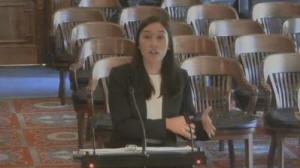|
The Illinois Supreme Court Thursday heard the case of Santana
Grayer. Grayer was convicted of vehicular hijacking in 2022,
following his arrest in 2020. The case alleged Grayer grabbed a
Lyft driver and threatened to kill them while driving him home
from a party.
According to court documents, the Lyft driver told the defendant
he could not drive the vehicle. The defendant then "got mad,"
grabbed the driver's shirt at his right shoulder, and threatened
to kill him. While grabbing his shoulder with his left hand,
Grayer reached his right hand toward his waist, leading the
driver to believe he had a weapon. The driver then pulled over
to a gas station and called police.
In 2022, Grayer was found guilty and sentenced to five years in
prison as the lower court discounted his intoxication while
determining his intent.
Cristina Law Merriman, Grayer's attorney, said the court is
wrong in holding that belief.
"In reviewing the sufficiency of the evidence, the appellate
court incorrectly found that Mr. Grayers' voluntary intoxication
was not relevant to the element-specific intent due to the 2002
amendment to section 6.3 of the criminal code," Law Merriman
said. "The appellate court majority was wrong."
Grayer thought he was being driven in the wrong direction
because he was under the influence, Law Merriman said.
"At Mr. Grayer's bench trial, the state's evidence showed that
Mr. Grayer was intoxicated at a social gathering. The people he
was with responsibly ordered a Lyft to take him home," Grayer
said. "During that Lyft, Mr. Grayer drunkenly thought he was
being driven in the wrong direction."
She said due to Grayer's intoxication, he did not know fully
know what he was doing.
"Mr. Grayer waited at that gas station for 20 minutes, appearing
to actually wait for the Lyft driver perhaps to complete the
ride," Law Merriman said.
The Illinois Supreme Court now has the issue under advisement.

|
|




